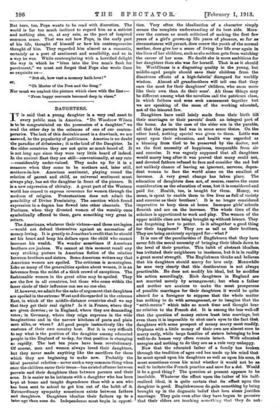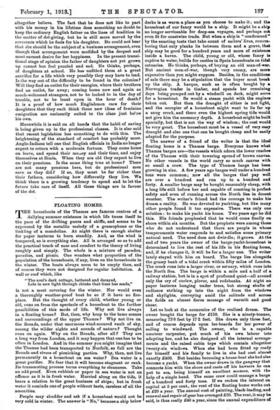DAUGHTERS.
IT is said that a young daughter is a very real asset to every public man in America. "Dr. Woodrow Wilson is to be congratulated on the possession of a daughter," we read the other day in the columns of one of our contem- poraries. The lack of this desirable asset is a drawback, we are assured, to the popularity of politicians. America is no doubt the paradise of debutantes; it is the land of the Daughter. In the older countries they are not quite so much heard of. It is not long ago since they were very little heard of indeed. In the ancient East they are still—conventionally, at any rate —considerably under-valued. They make up for it in a measure when they come to be mothers and, later still, mothers-in-law. American sentiment, playing round the relation of parent and child, as universal sentiment must always play, has set the daughter in front of the picture. It is a new expression of chivalry. A great part of the Western world has ceased to express reverence for women through the medium of religion. Protestantism does not admit the possibility of Divine Femininity. The emotion which found expression in a dogma has flowed into other channels. The Puritans, when they divested women of the worship once symbolically offered to them, gave something very great in return.
The Americans, whatever their virtues—and these are legion —would not defend themselves against an accusation of money-loving. It is greatly to Jonathan's credit that be should set his heart and heap his dollars upon the child who cannot increase his wealth. We wonder sometimes if American brothers are jealous. We cannot at this moment recall any very striking picture in American fiction of the relation between brothers and sisters. Some American writers say that American women are spoiled. The criticism is meaningless. Like so many of the generalities spoken about women, it is an inference from the midst of a thick crowd of exceptions. The fashionable women in the great cities may be spoiled. They are the few in all countries, but those who come within the inner circle of their influence can see no one else.
If, however, we admit for the sake of argument that daughters are spoiled in tbe extreme West and disregarded in the extreme East, in which of the middle-distance countries shall we say that they get their real rights ? Is it in France, where they are given dowries ; or in England, where they are demanding votes; in Germany, where they reign supreme in the wide imaginations and in the narrow kitchens of poets and plain men alike, or where ? All good people instinctively like the customs of their own country best. But it is very difficult to say what is the position of the daughter among educated people in the England of to-day, for that position is changing so rapidly. The last ten years have been revolutionary. Of course, men and women always loved their daughters, but they never made anything like the sacrifices for them which they are beginning to make now. Probably the ideal parental relation— never such a very common thing when once the children enter their teens—has existed oftener between parents and their daughters than between parents and their sons. It is easier to be intimate with a daughter who has been kept at home and taught dependence than with a son who has been sent to school to get him out of the habit of it. Extraordinary sympathy sometimes exists between fathers and daughters. Daughters idealize their fathers up to a later age than sons do. Independence must begin in opposi-
tion. Very often the idealization of a character simply means the complete understanding of its best side. More- over the custom so much criticized of making the first few years of a girl's grown-up life years of pleasure, so far as circumstances will permit, does renew the youth of the normal mother, does give her a sense of living her life over again in the lives of her children, such as she seldom gets from watching the career of her sons. No doubt she is more ambitious for her daughters than she was for herself. That is as it should be. Worldliness is a disgusting quality in the young, but middle-aged people should save their children from the disastrous effects of a high-falutin' disregard for worldly wisdom. Almost all grandmothers will tell one that they care the most for their daughters' children, wbo seem more like their own than do their sons'. Alt these things may be different among what the novelists call the patrician class, in which fathers and sons seek amusement together but we are speaking of the mass of the working educated, not of the leisured few.
Daughters have until lately made from their birth till their marriages or their parents' death an integral part, of the home. As in the case of the elder son in the parable, all that the parents had was in some sense theirs. On the other hand, nothing special was given to them. Little was spent upon their education, and health was regarded as a blessing from God to be preserved by the doctor, not as the first necessity of happiness, inseparable from air and exercise. It was vaguely supposed that all daughters would marry long after it was proved that many could not, and devoted fathers refused to face and consider the sad but not unlikely chance of leaving an ignorant, nervous, depen- dent woman to face the world alone on the smallest of incomes. A very great change has taken place. The education of daughters does not., of course, receive the same consideration as the education of sons, but it is considered and paid for. Health, too, is bought for them. Money, we mean, is spent to enable them to live lives as full of variety and exercise as their brothers '. It is no longer considered imperative to keep them at home. Immeilse girls' schools flourish and are on the increase. The whole time of the scholars is apportioned to work and play. The women of the upper middle class are being brought up without leisure. They are forgetting how to potter. Is it altogether a good thing for their happiness? They are as tall as their brothers, They are being anxiously equipped for—what ?
It is one of the peculiarities of Englishmen that they have never felt the moral necessity of bringing their ideals down to the level of their practice. This habit of abstract idealism has irritated their neighbours to insolence, but it is in reality a great moral strength. The Englishman thinks and believes that his daughters should marry for love only. Meanwhile he sees very clearly that this desideratum is not always practicable. He does not modify his ideal, but lie modifies his action accordingly. Rich daughters in England are not married merely by arrangement; but when a father and mother are anxious to make the most prosperous of possible marriages for their daughters it would be quite absurd for a foreigner to suppose that the whole matter has nothing to do with arrangement, or to imagine that the " settlements" which take so much time and thought bear no relation to the French dot. It is among the less well-off that the question of money enters least into marriage, but even there it is impossible to shut one's eyes to the fact that daughters with some prospect of money marry most readily. Orphans with a little money of their own are almost sure to marry early, while large families of sisters belonging to less well-to-do homes very often remain intact. With educated energies and nothing to do they are as a rule very unhappy.
Now that the educated father of a family has broken through the tradition of ages and has made up his mind that he must spend upon his daughters as well as upon his sons, it must sometimes cross his mind whether it would not be as
well to imitate the French practice and save for a. dot. Would
it be a good thing ? The question at present appears to be insoluble. Whatever the effect upon the father of his half- realized ideal, it is quite certain that its effect upon the daughter is good. Englishwomen do gain something by being brought up in the dogmatic belief that love alone justifies marriage. They gain even after they have begun to perceive that their elders are teaching somea'ng that they do not - altogether believe. The fact that he does not like to part with his money in his lifetime does something no doubt to keep the ordinary English father on the lines of tradition in the matter of dot-giving, but he is still more moved by the reverence which he feels for his daughter. He could not bear that she should be the subject of a business arrangement, even though that arrangement were modified by the deepest and most earnest desire for her happiness. In the present transi- tional stage of opinion the father of daughters not yet grown up cannot but feel puzzled and sad. He thinks, perhaps, of daughters at school. He has unfitted them at a great sacrifice for a life which very possibly they may have to lead. Is the way out of the difficulty to be found in the colonies? Will they find an outlet for their energies, where their brothers find an outlet, far away; coming home now and again as much-welcomed strangers, not to be looked to in the day of trouble, not to be leant upon in the hour of death? It is a proof of how much Englishmen care for their daughters that they each think these new ideas of feminine emigration are eminently suited to the class just below his own.
Meanwhile it is said on all hands that the habit of saving is being given up in the professional classes. It is also said that recent legislation has something to do with this. The heightening of the standard of comfort has probably more. Anglo-Indians tell one that English officials in India no longer expect to return with a moderate fortune. They come home on leave, and spend their money and their time, and enjoy themselves at Simla. When they are old they expect to live on their pensions. Is the same thing true at home ? There are not many pensions here, but do professional men save as they did ? If so, they must be far richer than their fathers, considering how differently they live. We think there is a growing tendency to spend and to let the future take care of itself. All these things are in favour of the dot.











































 Previous page
Previous page